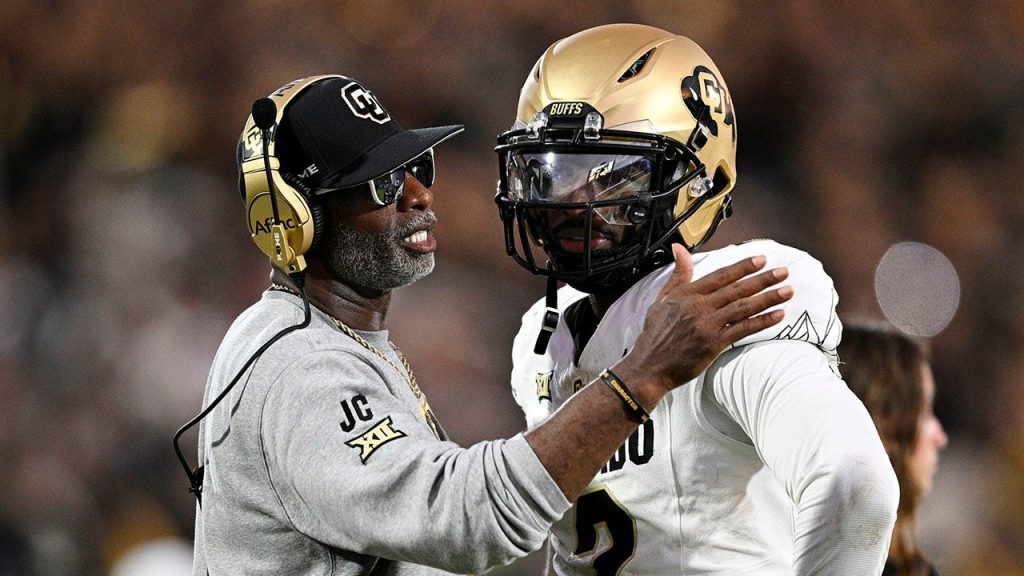Deion Sanders, a charismatic and transformative figure in college football, has sparked speculation about a potential jump to the NFL. Having orchestrated a remarkable turnaround at the University of Colorado, Sanders’s coaching prowess has attracted attention from professional teams, notably the Dallas Cowboys. While he has largely dismissed the immediate possibility of an NFL move, he acknowledged the allure, particularly if it meant continuing to coach his sons, one of whom, Shedeur Sanders, is projected to be a top pick in the upcoming NFL draft. This familial connection adds an intriguing layer to the narrative, suggesting that the prospect of maintaining a coaching relationship with his sons could be a significant factor in any future decision.
However, the prospect of Sanders leaving the collegiate ranks has prompted concern from some who believe his impact is most profoundly felt at the college level. Former NFL star Vince Wilfork, a Super Bowl champion with the New England Patriots, articulated this sentiment, arguing that Sanders’s mentorship is more crucial for young, developing athletes than established professionals. Wilfork emphasized the formative influence Sanders has on college players, suggesting that his guidance and leadership are particularly valuable during this critical stage of their lives and careers. He contrasted this with the NFL, where players are already established and financially secure, potentially making them less receptive to the kind of transformative coaching Sanders offers. Wilfork’s perspective underscores the unique role Sanders occupies in the college landscape, a role that goes beyond X’s and O’s and focuses on personal and character development.
Sanders’s coaching journey began at Jackson State, a historically Black university, where he quickly established a winning culture and attracted top talent. His move to Colorado amplified his impact, as several players, including his sons and the electrifying two-way star Travis Hunter, followed him to Boulder. Hunter’s subsequent Heisman Trophy win, a historic achievement for a primarily defensive player, further cemented Sanders’s reputation as a coach capable of developing exceptional talent. The emotional embrace between Hunter and Sanders after the Heisman ceremony symbolized the deep bond and mutual respect that characterize their relationship, further highlighting Sanders’s ability to connect with and inspire his players. This ability to connect with young athletes is at the heart of Wilfork’s argument for Sanders to remain in college football.
The Buffaloes, under Sanders’s guidance, experienced a resurgence, controlling their destiny for a College Football Playoff berth. However, a late-season loss to Kansas derailed their championship aspirations and ultimately prevented them from competing for a national title. Despite this setback, the season marked a significant step forward for the program, demonstrating the immediate and substantial impact Sanders had on the team’s performance and overall culture. This success, coupled with the development of high-profile players like Shedeur Sanders and Travis Hunter, has fueled the speculation surrounding his future and the possibility of a move to the professional ranks.
The contrasting perspectives on Sanders’s future highlight the complex calculus involved in such a decision. While the allure of the NFL, particularly the chance to coach his sons at the highest level, is undeniable, the argument for remaining in college football centers on the profound impact he has on young athletes. Sanders’s ability to mentor, inspire, and develop talent is seen as particularly valuable in the college environment, where players are still shaping their identities and navigating the challenges of transitioning to adulthood. This contrasts with the NFL, where players are established professionals and the focus is primarily on maximizing on-field performance.
The debate surrounding Sanders’s future hinges on the question of where his unique coaching style and personal influence can make the greatest difference. Will he choose the potential glamour and financial rewards of the NFL, perhaps driven by the opportunity to continue coaching his sons? Or will he remain in the college ranks, where he can continue to shape the lives and careers of young athletes who, as Wilfork suggests, may need his guidance and mentorship more? The decision will undoubtedly have far-reaching implications for both the college and professional football landscapes, as Sanders’s presence and influence are undeniable assets at either level.

